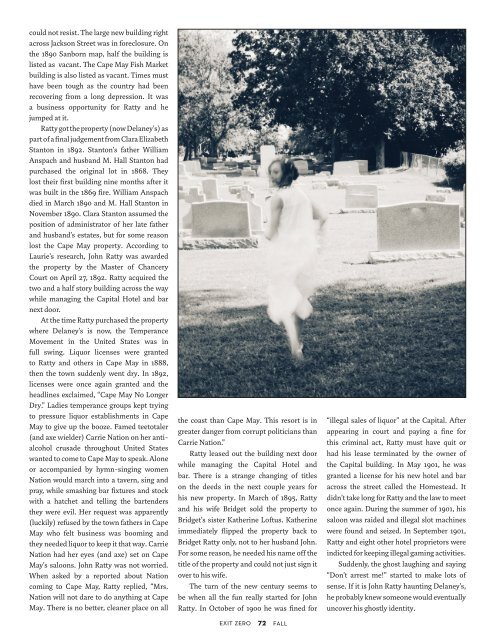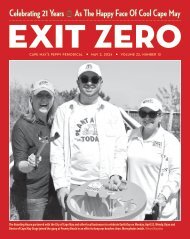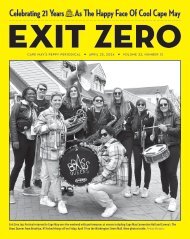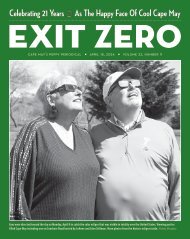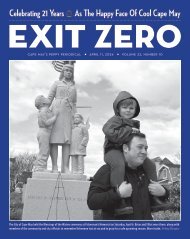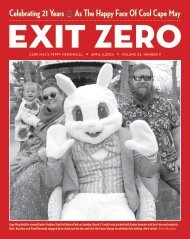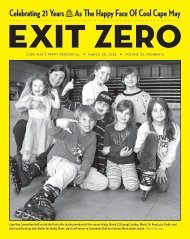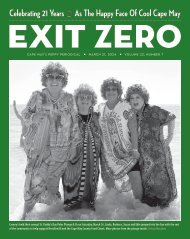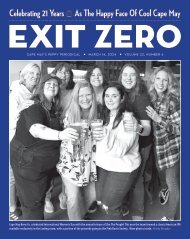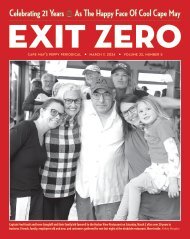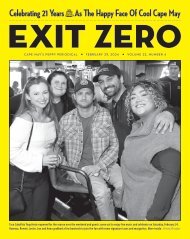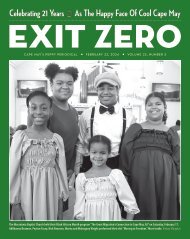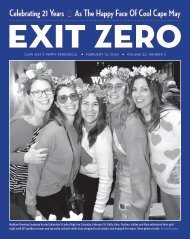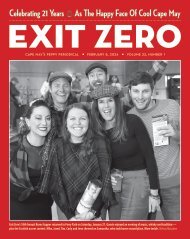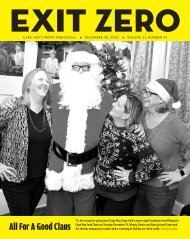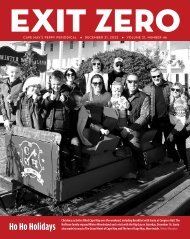Create successful ePaper yourself
Turn your PDF publications into a flip-book with our unique Google optimized e-Paper software.
could not resist. The large new building right<br />
across Jackson Street was in foreclosure. On<br />
the 1890 Sanborn map, half the building is<br />
listed as vacant. The Cape May Fish Market<br />
building is also listed as vacant. Times must<br />
have been tough as the country had been<br />
recovering from a long depression. It was<br />
a business opportunity for Ratty and he<br />
jumped at it.<br />
Ratty got the property (now Delaney’s) as<br />
part of a final judgement from Clara Elizabeth<br />
Stanton in 1892. Stanton’s father William<br />
Anspach and husband M. Hall Stanton had<br />
purchased the original lot in 1868. They<br />
lost their first building nine months after it<br />
was built in the 1869 fire. William Anspach<br />
died in March 1890 and M. Hall Stanton in<br />
November 1890. Clara Stanton assumed the<br />
position of administrator of her late father<br />
and husband’s estates, but for some reason<br />
lost the Cape May property. According to<br />
Laurie’s research, John Ratty was awarded<br />
the property by the Master of Chancery<br />
Court on April 27, 1892. Ratty acquired the<br />
two and a half story building across the way<br />
while managing the Capital Hotel and bar<br />
next door.<br />
At the time Ratty purchased the property<br />
where Delaney’s is now, the Temperance<br />
Movement in the United States was in<br />
full swing. Liquor licenses were granted<br />
to Ratty and others in Cape May in 1888,<br />
then the town suddenly went dry. In 1892,<br />
licenses were once again granted and the<br />
headlines exclaimed, “Cape May No Longer<br />
Dry.” Ladies temperance groups kept trying<br />
to pressure liquor establishments in Cape<br />
May to give up the booze. Famed teetotaler<br />
(and axe wielder) Carrie Nation on her antialcohol<br />
crusade throughout United States<br />
wanted to come to Cape May to speak. Alone<br />
or accompanied by hymn-singing women<br />
Nation would march into a tavern, sing and<br />
pray, while smashing bar fixtures and stock<br />
with a hatchet and telling the bartenders<br />
they were evil. Her request was apparently<br />
(luckily) refused by the town fathers in Cape<br />
May who felt business was booming and<br />
they needed liquor to keep it that way. Carrie<br />
Nation had her eyes (and axe) set on Cape<br />
May’s saloons. John Ratty was not worried.<br />
When asked by a reported about Nation<br />
coming to Cape May, Ratty replied, “Mrs.<br />
Nation will not dare to do anything at Cape<br />
May. There is no better, cleaner place on all<br />
the coast than Cape May. This resort is in<br />
greater danger from corrupt politicians than<br />
Carrie Nation.”<br />
Ratty leased out the building next door<br />
while managing the Capital Hotel and<br />
bar. There is a strange changing of titles<br />
on the deeds in the next couple years for<br />
his new property. In March of 1895, Ratty<br />
and his wife Bridget sold the property to<br />
Bridget’s sister Katherine Loftus. Katherine<br />
immediately flipped the property back to<br />
Bridget Ratty only, not to her husband John.<br />
For some reason, he needed his name off the<br />
title of the property and could not just sign it<br />
over to his wife.<br />
The turn of the new century seems to<br />
be when all the fun really started for John<br />
Ratty. In October of 1900 he was fined for<br />
exit zero 72 fall<br />
“illegal sales of liquor” at the Capital. After<br />
appearing in court and paying a fine for<br />
this criminal act, Ratty must have quit or<br />
had his lease terminated by the owner of<br />
the Capital building. In May 1901, he was<br />
granted a license for his new hotel and bar<br />
across the street called the Homestead. It<br />
didn’t take long for Ratty and the law to meet<br />
once again. During the summer of 1901, his<br />
saloon was raided and illegal slot machines<br />
were found and seized. In September 1901,<br />
Ratty and eight other hotel proprietors were<br />
indicted for keeping illegal gaming activities.<br />
Suddenly, the ghost laughing and saying<br />
“Don’t arrest me!” started to make lots of<br />
sense. If it is John Ratty haunting Delaney’s,<br />
he probably knew someone would eventually<br />
uncover his ghostly identity.


